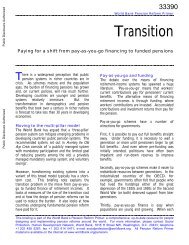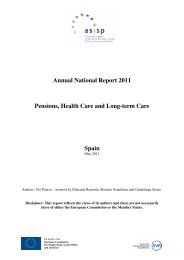Financial Sector Development in Africa: Opportunities ... - World Bank
Financial Sector Development in Africa: Opportunities ... - World Bank
Financial Sector Development in Africa: Opportunities ... - World Bank
Create successful ePaper yourself
Turn your PDF publications into a flip-book with our unique Google optimized e-Paper software.
164 Fuchs, Losse-Mueller, and Witte<br />
only if supervisory capacity is considered a precondition for lower<strong>in</strong>g<br />
capital requirements. Without a significant strengthen<strong>in</strong>g of supervisory<br />
capacity <strong>in</strong> <strong>Africa</strong>, the implementation of Basel II is built on shaky<br />
ground.<br />
Implement<strong>in</strong>g Basel II will carry significant costs for banks and regulators<br />
alike. Build<strong>in</strong>g up supervisory capacity—<strong>in</strong>clud<strong>in</strong>g staff tra<strong>in</strong><strong>in</strong>g, new<br />
processes, and substantial <strong>in</strong>vestments <strong>in</strong> <strong>in</strong>formation technology (IT)<br />
<strong>in</strong>frastructure—is beyond the budget scope of many regulators <strong>in</strong> <strong>Africa</strong>n<br />
low-<strong>in</strong>come countries. For the European bank<strong>in</strong>g sector, Europe<br />
Economics (2009) estimated that the <strong>in</strong>troduction of new capital rules<br />
would cause average one-off expenses of 1.57 percent of annual operat<strong>in</strong>g<br />
costs for large banks and 0.92 percent for small banks. These figures<br />
apply to the adoption of the equivalent European Union directives for<br />
European banks. Costs for <strong>Africa</strong>n banks are likely to be higher s<strong>in</strong>ce the<br />
<strong>in</strong>itial IT and staff capacity is relatively low.<br />
Yet many <strong>Africa</strong>n supervisors look toward implement<strong>in</strong>g Basel II with<br />
a view to enhanc<strong>in</strong>g f<strong>in</strong>ancial stability. In 2010, 15 out of 20 <strong>Africa</strong>n<br />
respondents to a survey of the <strong>F<strong>in</strong>ancial</strong> Stability Institute stated their<br />
<strong>in</strong>tention to implement Basel II, <strong>in</strong>clud<strong>in</strong>g four countries that <strong>in</strong>dicated<br />
their objective was to go beyond the Standardized Approach. These f<strong>in</strong>d<strong>in</strong>gs<br />
are <strong>in</strong> l<strong>in</strong>e with other surveys <strong>in</strong> the region and the general thrust of<br />
regulatory reform objectives underly<strong>in</strong>g the policy dialogue <strong>in</strong> <strong>Africa</strong>.<br />
<strong>Africa</strong>n regulators state a variety of reasons why Basel II is so high on<br />
the agenda, despite it not be<strong>in</strong>g mandatory outside the BCBS member<br />
states. They are concerned that Basel I is com<strong>in</strong>g to be perceived as an<br />
<strong>in</strong>ferior standard by <strong>in</strong>ternational <strong>in</strong>vestors and that <strong>Africa</strong>n markets may<br />
be penalized by <strong>in</strong>ternational market participants (Tran 2005) or that<br />
<strong>Africa</strong>n banks will be denied access to foreign markets <strong>in</strong> the future if<br />
they do not comply with the latest Basel standards (Ward 2002).<br />
Accord<strong>in</strong>g to a <strong>F<strong>in</strong>ancial</strong> Stability Institute (2004) study, the ma<strong>in</strong> driver<br />
for non-BCBS countries to move toward Basel II is that foreign-controlled<br />
banks or local branches of foreign banks operat<strong>in</strong>g under Basel II expect<br />
low-<strong>in</strong>come country regulators to adopt the framework as well. Whether<br />
or not these concerns are justified, they have accelerated the dispersal of<br />
the Basel accords <strong>in</strong> <strong>Africa</strong> and elsewhere.<br />
Low regulatory capacity and the costs of implementation warrant caution<br />
not rush <strong>in</strong> mov<strong>in</strong>g to implement the Basel II capital framework <strong>in</strong><br />
<strong>Africa</strong>. The BCBS itself encourages worldwide adoption, but recognizes<br />
that Basel II “may not be a first priority for all non-G10 supervisory<br />
authorities” and recommends carefully consider<strong>in</strong>g the benefits of such a







